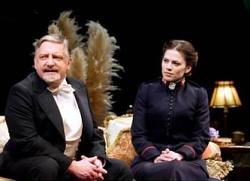Major Barbara Review 2008
The manufacture of munitions and the Salvation Army might seem unlikely bedfellows, even if they both have military features or connections. But the central theme of this 1905 play written by fervent socialist, George Bernard Shaw, is the question of whether a charitable institution, steeped in Christian principles, should accept funds from 'manufacturers of mutilation and murder' such as munitions companies, or indeed purveyors of 'the demon drink'.
'Major Barbara' opens with Lady Britomart Undershaft reviewing the state of her family's finances with her dour and rather aloof son, Stephen. Estranged from her wealthy husband, munitions manufacturer Andrew Undershaft, she has nonetheless decided to appeal to him for funds and has invited him to her house to broach the subject. Reintroduced to his family, the multi-millionaire agrees to visit the shelter where his daughter, Barbara, serves as a Major in the Salvation Army on condition that Barbara also visits his munitions factory.
While Undershaft senior observes his daughter's virtues in the saving of souls, he's encouraged to provide financial support to the Army by the head of the shelter, and promptly produces a cheque for the princely sum of £5,000. Barbara is shocked to her innermost being and promptly returns to 'civvy street'.
A sub-plot surrounds the question of who will inherit Mr Undershaft's enormous and highly lucrative business empire. According to the traditions of the firm, the inheritance must pass to a foundling who must also change his name to Andrew Undershaft. Surprisingly, Mr Undershaft senior finds his successor within the arms of his own family.
Bernard Shaw's play caused some controversy when it first opened at the Royal Court Theatre in 1905. Critical reaction forced Shaw to write a preface in the published version of the play to the effect that he was not criticising the work of the Salvation Army as some reviewers had suggested.
Simon Russel Beale gives a studied and meticulously impressive performance as Andrew Undershaft. Articulate and intelligent but with a streak of ruthlessness, his exhortation to his potential son-in-law to 'make war on war' ultimately fails to convince. This is not due to Mr Beale's playing, but rather to our own experience of events since Shaw's play first appeared. The fact is that having weapons of terrible power is not alone sufficient to guarantee freedom from war as Undershaft suggests. Politicians, we know, are easily persuaded to use arms to solve problems - witness the recent invasion of Iraq. And corporate empires, ever eager for greater profits, view wars as more or less essential to develop their armaments businesses as well as the personal fortunes of those who run them.
Shaw's play is given a very fair hearing in this stimulating and polished revival, directed by the National's artistic director, Nicholas Hytner. The playwright seems to be currently in vogue at the National - Shaw's St Joan was also in the Olivier theatre just last summer. Both these plays have been worth reconsidering, but though Major Barbara is sharply witty and thought-provoking, it doesn't resolve matters decisively. As we see in the final act, the Undershaft family are mesmerised by their father's factory and the model village in which its workers are housed. The problem is that although the factory provides income for the workers and saves them from the menace of poverty, it does, in a very real sense 'own' them too.
Though I commend the excellent work done by the Salvation Army, it's difficult to decide just how they - or other charities - should finance their activities. Money is good money no matter where it comes from? I can't think so. If morality is the question, it also has to be part of the solution.
(Peter Brown)
What the popular press had to say.....
PAUL TAYLOR for THE INDEPENDENT says, "His [Nicholas Hytner] production revels in the play's argumentative energy and it does a most persuasive job in drawing out the emotional subtext of the debate." NICHOLAS DE JONGH for THE EVENING STANDARD says, "Elegantly nuanced production...remains a timeless play for today." MICHAEL BILLINGTON says, "Delivered with wit and style." CHARLES SPENCER for THE DAILY TELEGRAPH says, "Full of zest, but lacks the flesh and blood of great drama." BENEDICT NIGHTINGALE for THE TIMES says, "Packed with wit, dramatic colour and articulate energy."
External links to full reviews from popular press
Independent
Guardian
The Times
Daily Telegraph
Production photos by Catherine Ashmore
Originally published on
